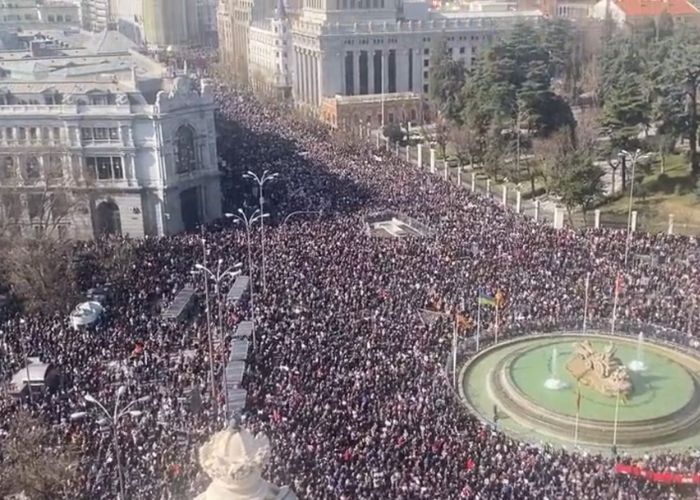Hundreds of thousands of people demonstrated in Madrid on Sunday 12 February against the dismantling of public healthcare. They used the slogan ‘Madrid stands up and demands public healthcare’
Hundreds of thousands of people took to the streets of Madrid en masse on Sunday. They demonstrated against the dismantling of public healthcare in the Spanish capital and demanded that the regional president, Isabel Díaz Ayuso, listen to the demands of health workers and residents of the region to stop the ‘dismantling’ of primary care. There were also smaller-scale demonstrations in other Spanish towns against the breakdown of healthcare.
The government delegation in Madrid puts the number of participants at 250,000, while organisers estimate the turnout at one million. With these figures, the expected turnout would be higher than the previous demonstration on 13 November.
Involvement
The event was organised by residents of the region and supported by more than 74 civil society organisations. Besides neighbourhood groups, trade unions, leftist political parties, health associations and workers’ platforms, among others, cultural figures such as Rozalén, Carlos Bardem, Luis Pastor, Juan Echanove, Juan Diego Botto, Alberto San Juan and Antonio de la Torre expressed their support.
The protest was attended by the heads of the unions UGT and CCOO, as well as the spokespersons of the parliamentary groups in the Madrid assembly and the municipal groups of PSOE, Unidas Podemos and Más Madrid.
The protesters called for the resignation of Ayuso and Health Minister Enrique Ruiz Escudero for leaving “more than a million Madrid citizens without a doctor and paediatrician in primary care”.
Under the slogan ‘Madrid stands up and demands public health and solutions to the primary care plan’, the demonstration began at noon with columns advancing from Nuevos Ministerios (north), Plaza de España (west), Hospital de La Princesa (east) and Legazpi (south), to emerge at Plaza de Cibeles.
More resources for healthcare
UGT-Madrid secretary-general Marina Priero, while attending the march, demanded that Isabel Díaz Ayuso’s government provide material and human resources to the Madrid public health system to guarantee citizens’ right to health, as well as the reopening of outpatient emergency services, home care and rural care.
The general secretary of trade union CCOO in Madrid, Paloma López, demanded that the Community of Madrid adopt an absolutely’ different health policy and not spend public money on private hospitals. The Conservative Party PP stressed that the Madrid autonomous region will continue to improve health care despite the ‘shouting’ and ‘attempts to create tension’ from the left. We are faced with a significant shift of public money to private hospitals and we cannot have that. We need a completely different policy where money is reinvested in healthcare. Healthcare should again be accessible to everyone, not just those who can afford private healthcare.
Strike
This demonstration is in support of health workers. On 21 November, 4,240 GPs and 720 paediatricians in primary care began an indefinite strike. They are protesting against the new reorganisation of the care model for out-of-hospital emergency care.
The regional government speaks of a “political strike”. It accuses the health workers of a lack of will to reach agreements to ‘extend’ the strike until the elections. The demonstration, according to regional minister Enrique Ruiz Escudero, is ‘not about public health’ but on other issues.
Back to basics
In this context, the demonstration organisers are calling for the restoration of ‘the essence’ of primary care, the ‘central axis’ of the public health system. This consists of health promotion, disease prevention, community participation and lifelong supervision of the patient and family. This can reduce emergency room visits, hospital admissions and deaths by 30%’.
At the same time, they demand an increase in human resources in all categories of healthcare. This includes “decent and stable contracts that prevent the exodus of professionals” to other communities and countries. They also point out that 600,000 adults in Madrid have no doctor assigned and 212,000 children no paediatrician.
Angle of opinion regional government
Regional government sources point out that Madrid is the region with the highest hourly coverage in primary care in public health. Moreover, the average waiting time for primary care in public health is half the national average. Also, ‘Madrid has the best hospital network with 35 public hospitals that are international benchmarks and operate the most modern and complete equipment in Europe’.
The sources also highlight that the region is a leader in transplants and a pioneer in mental health care. The most advanced treatments are used there, waiting lists are among the lowest in Spain and the Ministry of Health is working to further reduce them.
Moreover, more than €200 million have been allocated to the primary care plan. Salaries have increased by an average of €3,800 for GPs and €3,300 for paediatricians over the past year.


